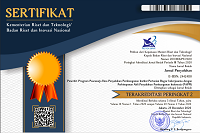PEMBINAAN WANITA PENGOLAH IKAN ASIN DI PESISIR MUARA ANGKE JAKARTA UTARA
Keywords:
Salty fish, Empowerment, Market system
Abstract
Women who were involved in processing salty fish at Muara Angke, north of Jakarta, had significant contribution to their salty fish business. So far, they had never been involved in any empowerment program offered either by government institution or by non government organization. Men were mostly involved in such empowerment activities. In this conjunction, the objectives of this study were: (1) to determine the skills of the women involved in salty fish processing, (2) to identify both the internal and external factors related to the women’s skills in processing salty fish, and (3) to determine the relationship intensity of the women’ skills in salty fish processing and their productivity in processing such fish. The findings of the study were: the women productivity in salty fish processing was significantly related to their skills in getting qualified fresh fish, in processing and drying salty fish, in book keeping and accounting, and in getting information on marketing system.Downloads
Published
2006-06-01
How to Cite
NurmaliaN., & LumintangR. W. (2006). PEMBINAAN WANITA PENGOLAH IKAN ASIN DI PESISIR MUARA ANGKE JAKARTA UTARA. Jurnal Penyuluhan, 2(2). https://doi.org/10.25015/penyuluhan.v2i2.2186
Section
Articles
Authors who publish with this journal agree to the following terms:
- Authors retain copyright and grant the journal right of first publication with the work simultaneously licensed under a

This work is licensed under a Creative Commons Attribution 4.0 International License that allows others to share the work with an acknowledgement of the work's authorship and initial publication in this journal. - Authors are able to enter into separate, additional contractual arrangements for the non-exclusive distribution of the journal's published version of the work (e.g., post it to an institutional repository or publish it in a book), with an acknowledgement of its initial publication in this journal.
- Authors are permitted and encouraged to post their work online (e.g., in institutional repositories or on their website) prior to and during the submission process, as it can lead to productive exchanges, as well as earlier and greater citation of published work (See The Effect of Open Access).















